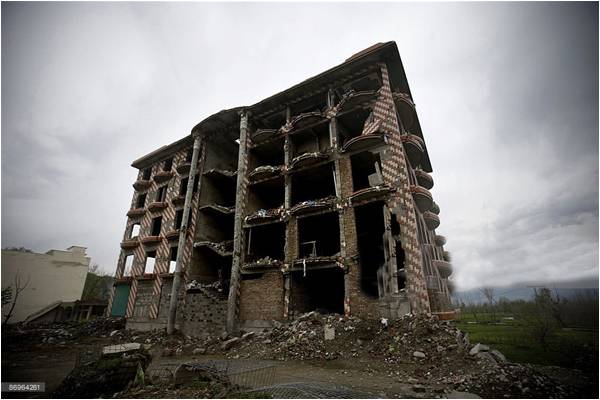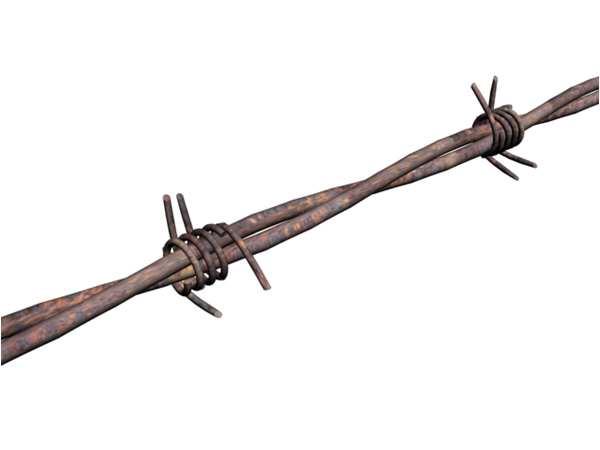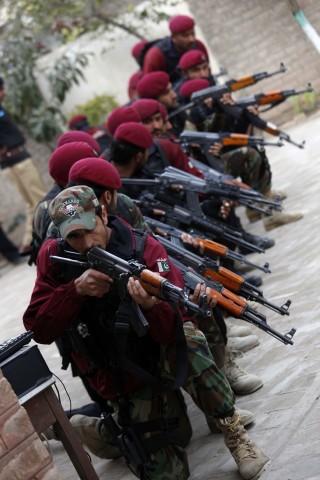
The Pakistani Taliban’s recent declaration of war on modern education has sparked new fears in universities in Malakand, an area that was once a stronghold of Mullah Fazlullah.
On January 20, at least four gunmen stormed Bacha Khan University (BKU) in Charsadda and killed around 22 people, mostly students. Khalifa Umar Mansoor, a key military commander of the Fazlullah-led Tehrik-e-Taliban Pakistan (TTP), claimed responsibility for the attack, and threatened more attacks on “schools, colleges and universities”. He also claims to be the orchestrator of the December 2014 carnage at the Army Public School in Peshawar, in which at least 132 children and nine staff members were killed.
Since the warning, there has been a fresh drive to strengthen security measures at schools all over the country. But students and teachers of the universities in Malakand – where the TTP destroyed around 640 educational institutions from 2007 to 2009 – are especially concerned. And the enhanced security measures – such as walkthrough gates, metal detectors, new checkpoints, higher fences and more weapons – are doing little to address their fears.
“Class attendance is very low. Most of the students are reluctant to come to the university. Even the teachers are not showing up,” said an instructor at the University of Malakand. The university is located in the Chakdara area of Lower Dir, and is the largest higher education institution in the entire division. Most students and many teachers, especially women, have left the hostels. “Even before the operation against the attackers at BKU was over, parents had arrived at our university to take their daughters home,” he said.

“It will take time for the trauma to heal,” said Prof Dr Arab Naz, the head of Social Sciences Department at the University of Malakand. “The attendance is increasing day by day.”
The university has 62 security guards and is about to hire another 10, said Dost Muhammad Khan, a spokesman for the university. “Security agencies recommend we keep 100 guards on the 85-acre campus.”
Troops from the Elite Force of the police are also deployed on the university premises. New pickets are being built, and the 25km boundary wall needs more work, which will start soon.
As the number of checkpoints increased, so did the duty hours of the security guards. “The duty shift has been extended from eight hours to 12,” one of them told me. He said the new duty schedule was “inhumane”, with one day off after 10 consecutive days of duty.
During a 2009 visit by Taliban militants, a security guard was shot and injured and another was beaten up “brutally”. Farman, the guard who was shot, recovered and resumed his duty, but he still has health problems. The university does not pay his hospital bills.
“We were initially hired as watchmen and security monitors, and only carried batons,” another guard said. “As the security conditions deteriorated, we picked up guns.” Carrying a rifle, three magazines and a torch for 12 hours was difficult for an elderly guard, he said. “It surely does affect the quality of our work.” Most security guards are retired law-enforcement personnel.
 The University of Swat has 84 guards for its 11 sub-campuses, five of which have been closed down after last month’s attack on BKU. Most of them are in Mingora and its surroundings. A police report was lodged against the Rahimabad Campus for poor security arrangements. The university has hired a new building in the Kanju township for the students of the campuses that were shut down. In 2014, the university had suspended a bus service for students. In 2015, it postponed its convocation because of security concerns.
The University of Swat has 84 guards for its 11 sub-campuses, five of which have been closed down after last month’s attack on BKU. Most of them are in Mingora and its surroundings. A police report was lodged against the Rahimabad Campus for poor security arrangements. The university has hired a new building in the Kanju township for the students of the campuses that were shut down. In 2014, the university had suspended a bus service for students. In 2015, it postponed its convocation because of security concerns.
“The University of Swat is at a very high risk, because its sub-campuses are spread out and do not have proper security arrangements,” local journalist Niaz Ahmad Khan said.
The spokesman for the university said they had devised “our own intelligence system”. “We monitor all campuses strictly, and some teachers have offered to volunteer to make the intelligence system effective,” said Aftab Ahmad.
Mingora is the town where Taliban had attacked Malala Yousafzai in 2012. She went on to become a Nobel laureate, and was praised all over the globe for her activism for girls’ education. In March 2011, Taliban militants attacked the Government Girls Degree College in Lund Khwar area of Mardan, leaving at least 35 students injured.
In the Sheringal area of Upper Dir, the Shaheed Benazir Bhutto University has no boundary walls to protect its 3,500 students and 100 teachers. The university is located amidst a dense forest. Currently closed for winter, improving security will be a formidable challenge for the institution when it reopens on March 1.
According to Amanullah, a student, it may not be possible for the classes to resume on time. In the wake of the APS attack in 2014, the university remained from December to April. “They were advised to build boundary walls, but the construction work has not started yet,” he said.
Shahzad Arshad, another student of the university, said most students stayed at private hostels and those on the campus were largely empty. “We are not ready to stay in hostels until they construct boundary walls and ensure foolproof security,” he said.
“We are doing our best to strengthen security,” said Anwar Zada, the assistant registrar. “But we cannot build boundary walls in a week or a month. The construction process takes time.”
A campus of Mardan’s Abdul Wali Khan University is located in the Timergara area of Lower Dir. It was inaugurated by leaders of the Awami National Party (ANP) when it was in government in the Khyber Pakhtunkhwa province.
When Taliban militants began attacking the leaders and workers of ANP, the students of the university lived in constant fear, an official told me. He said security at the campus was enhanced from time to time. The boundary walls were raised, a lighting system was installed, and there are security cameras all over the premises. “Security agencies are providing proper training to our guards, so that they can encounter any challenges they have to face,” said Dr Mohibullah, the head of the campus. Before the reopening of the university, the security system would be “up to the mark”, he added.
Another campus of the same university, located in the Buner district, is protected by 32 guards. The institution plans to add more members to the crew. “We are determined to protect our students and provide them best environment,” said Abdur Rehman, an official of the university.
Buner witnessed the fiercest clashes between Fazlullah-led Taliban and the security forces from 2007 to 2009. Nine students from Kinger Gali and nearby towns escaped the attack on BKU. “I can’t send you to a deathtrap,” Muhammad Riaz, a student of Buner University, was told by his mother.
Amid such heightened concerns, the deputy inspector general of Malakand range said police were conducting training sessions for security guards at universities. DIG Azad Khan said his department has advised them to hire more men and equip them properly. “A platoon of Elite Force has been stationed inside the premises of University of Malakand to effectively and quickly respond in an emergency-like situation,” he said, adding that police and Levies personnel were also stationed at the Sheringal university.
Tahir Ali is a freelance reporter based in Islamabad
Twitter: @tahirafghan
On January 20, at least four gunmen stormed Bacha Khan University (BKU) in Charsadda and killed around 22 people, mostly students. Khalifa Umar Mansoor, a key military commander of the Fazlullah-led Tehrik-e-Taliban Pakistan (TTP), claimed responsibility for the attack, and threatened more attacks on “schools, colleges and universities”. He also claims to be the orchestrator of the December 2014 carnage at the Army Public School in Peshawar, in which at least 132 children and nine staff members were killed.
A guard said the new duty schedule was 'inhumane'
Since the warning, there has been a fresh drive to strengthen security measures at schools all over the country. But students and teachers of the universities in Malakand – where the TTP destroyed around 640 educational institutions from 2007 to 2009 – are especially concerned. And the enhanced security measures – such as walkthrough gates, metal detectors, new checkpoints, higher fences and more weapons – are doing little to address their fears.
“Class attendance is very low. Most of the students are reluctant to come to the university. Even the teachers are not showing up,” said an instructor at the University of Malakand. The university is located in the Chakdara area of Lower Dir, and is the largest higher education institution in the entire division. Most students and many teachers, especially women, have left the hostels. “Even before the operation against the attackers at BKU was over, parents had arrived at our university to take their daughters home,” he said.

“It will take time for the trauma to heal,” said Prof Dr Arab Naz, the head of Social Sciences Department at the University of Malakand. “The attendance is increasing day by day.”
The university has 62 security guards and is about to hire another 10, said Dost Muhammad Khan, a spokesman for the university. “Security agencies recommend we keep 100 guards on the 85-acre campus.”
Troops from the Elite Force of the police are also deployed on the university premises. New pickets are being built, and the 25km boundary wall needs more work, which will start soon.
As the number of checkpoints increased, so did the duty hours of the security guards. “The duty shift has been extended from eight hours to 12,” one of them told me. He said the new duty schedule was “inhumane”, with one day off after 10 consecutive days of duty.
During a 2009 visit by Taliban militants, a security guard was shot and injured and another was beaten up “brutally”. Farman, the guard who was shot, recovered and resumed his duty, but he still has health problems. The university does not pay his hospital bills.
“We were initially hired as watchmen and security monitors, and only carried batons,” another guard said. “As the security conditions deteriorated, we picked up guns.” Carrying a rifle, three magazines and a torch for 12 hours was difficult for an elderly guard, he said. “It surely does affect the quality of our work.” Most security guards are retired law-enforcement personnel.
 The University of Swat has 84 guards for its 11 sub-campuses, five of which have been closed down after last month’s attack on BKU. Most of them are in Mingora and its surroundings. A police report was lodged against the Rahimabad Campus for poor security arrangements. The university has hired a new building in the Kanju township for the students of the campuses that were shut down. In 2014, the university had suspended a bus service for students. In 2015, it postponed its convocation because of security concerns.
The University of Swat has 84 guards for its 11 sub-campuses, five of which have been closed down after last month’s attack on BKU. Most of them are in Mingora and its surroundings. A police report was lodged against the Rahimabad Campus for poor security arrangements. The university has hired a new building in the Kanju township for the students of the campuses that were shut down. In 2014, the university had suspended a bus service for students. In 2015, it postponed its convocation because of security concerns.“The University of Swat is at a very high risk, because its sub-campuses are spread out and do not have proper security arrangements,” local journalist Niaz Ahmad Khan said.
The spokesman for the university said they had devised “our own intelligence system”. “We monitor all campuses strictly, and some teachers have offered to volunteer to make the intelligence system effective,” said Aftab Ahmad.
Mingora is the town where Taliban had attacked Malala Yousafzai in 2012. She went on to become a Nobel laureate, and was praised all over the globe for her activism for girls’ education. In March 2011, Taliban militants attacked the Government Girls Degree College in Lund Khwar area of Mardan, leaving at least 35 students injured.
In the Sheringal area of Upper Dir, the Shaheed Benazir Bhutto University has no boundary walls to protect its 3,500 students and 100 teachers. The university is located amidst a dense forest. Currently closed for winter, improving security will be a formidable challenge for the institution when it reopens on March 1.
According to Amanullah, a student, it may not be possible for the classes to resume on time. In the wake of the APS attack in 2014, the university remained from December to April. “They were advised to build boundary walls, but the construction work has not started yet,” he said.
Shahzad Arshad, another student of the university, said most students stayed at private hostels and those on the campus were largely empty. “We are not ready to stay in hostels until they construct boundary walls and ensure foolproof security,” he said.
Shaheed Benazir Bhutto University has no boundary walls
“We are doing our best to strengthen security,” said Anwar Zada, the assistant registrar. “But we cannot build boundary walls in a week or a month. The construction process takes time.”
A campus of Mardan’s Abdul Wali Khan University is located in the Timergara area of Lower Dir. It was inaugurated by leaders of the Awami National Party (ANP) when it was in government in the Khyber Pakhtunkhwa province.
When Taliban militants began attacking the leaders and workers of ANP, the students of the university lived in constant fear, an official told me. He said security at the campus was enhanced from time to time. The boundary walls were raised, a lighting system was installed, and there are security cameras all over the premises. “Security agencies are providing proper training to our guards, so that they can encounter any challenges they have to face,” said Dr Mohibullah, the head of the campus. Before the reopening of the university, the security system would be “up to the mark”, he added.
Another campus of the same university, located in the Buner district, is protected by 32 guards. The institution plans to add more members to the crew. “We are determined to protect our students and provide them best environment,” said Abdur Rehman, an official of the university.
Buner witnessed the fiercest clashes between Fazlullah-led Taliban and the security forces from 2007 to 2009. Nine students from Kinger Gali and nearby towns escaped the attack on BKU. “I can’t send you to a deathtrap,” Muhammad Riaz, a student of Buner University, was told by his mother.
Amid such heightened concerns, the deputy inspector general of Malakand range said police were conducting training sessions for security guards at universities. DIG Azad Khan said his department has advised them to hire more men and equip them properly. “A platoon of Elite Force has been stationed inside the premises of University of Malakand to effectively and quickly respond in an emergency-like situation,” he said, adding that police and Levies personnel were also stationed at the Sheringal university.
Tahir Ali is a freelance reporter based in Islamabad
Twitter: @tahirafghan

